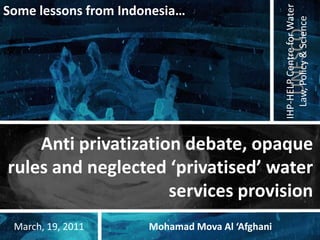Steps presentation
- 1. Some lessons from IndonesiaâĶAnti privatization debate, opaque rules and neglected âprivatisedâ water services provisionMohamadMova Al âAfghaniMarch, 19, 2011
- 2. Anti privatization debates Around 868 individuals and 16 non governmental organizations asked the Constitutional Court to revoke the Law 7/2004 on Water Resources
- 3. Anti privatization debates âThese agencies are not contributing to constructive advocacy, but channel their energy in the redundant debate of anti-privatization by focusing on two specific Jakarta concessions. There are over 324 PDAMs in Indonesia that provide piped-water services to the citizens. Depolarization of public debates must begin. Only then can a mutually enforcing and reinforcing water accountability framework be developed.â (A. Regmi)
- 4. Opaque rules Out of 100 Articles in the Water Law, only one paragraph specifically regulates private sector participation, paragraph 4 of Article 40: âCooperatives, privately-owned business enterprises and the [members of the] society may participate in the undertaking of the development of drinking water provision system
- 5. Opaque rules While paragraph 3 of Article 40 of the Water Law reads: âState Owned Enterprises and Regional Owned Enterprise are the undertakers of drinking water provision systemâ Â Is that mean that private sectors are not the undertakers?
- 6. Opaque RulesImplementing regulation of the Water Law states:âcooperatives and/or privately owned business enterprise may participate in the development of drinking water provision system in regions which is not yet covered by services provided by SOE or regional SOEsâ (GR-16, Article 64.1)Does this means âgreenfieldâ-only projects? What about BOT WTP project in already-served areas?
- 7. Neglected PSPs: Jakarta vs Bogor
- 8. Neglected PSPs: Batam case A water provider was charged by the competition commission for:discriminating business entities (x)
- 9. abusing dominant position (x)
- 10. controlling the production and marketing of goods which results in monopolistic practices Towards regulating PSPsDifferences in Administrative Legal SystemThe administrative Court can Only decide a case: DismissedLapsedRejectedProven: Order the official to revoke, issue or revoke old Decision and issuea new oneNo âAdministrative Contractâ, no power to modify PSP contract
- 11. Towards Regulating PSPsWhat is a concession? Several types of licenses: Dispensasi (dispensation), Lisensi (licence), and Konsesi (concession). A concession is ââĶan administrative decision which is legally very complex as it contains a set of dispensations, permits and licences followed by some kind of limited âgovernmental authoritiesâ to the concessionairesâ
- 12. Towards Regulating PSPsPublic Service LawFreedom of Information LawModel Regional-By-LawPotential, but need reforms
- 13. Thank You




![Opaque rules Out of 100 Articles in the Water Law, only one paragraph specifically regulates private sector participation, paragraph 4 of Article 40: âCooperatives, privately-owned business enterprises and the [members of the] society may participate in the undertaking of the development of drinking water provision system](https://image.slidesharecdn.com/stepspresentation-110721165406-phpapp02/85/Steps-presentation-4-320.jpg)







